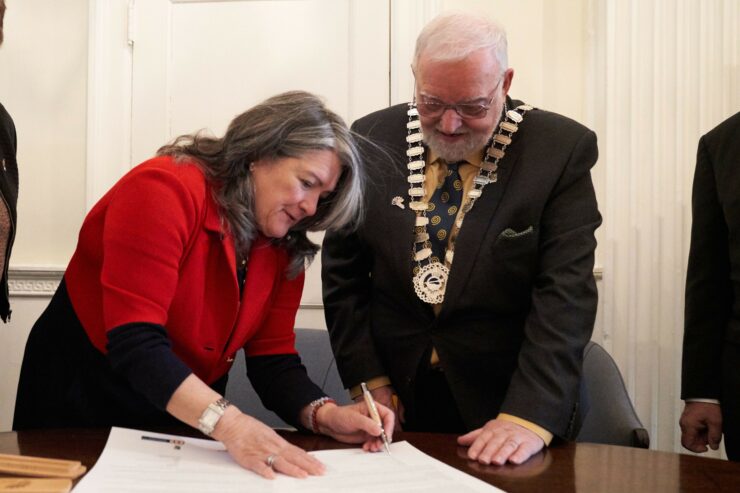
Older people stand to benefit from a new twinning agreement between New York City and the Irish Age Friendly Programme to advance initiatives that prepare society for population aging.
The twinning commits both sides to share knowledge on age friendly programs and builds on the 2011 Dublin Declaration of Age-Friendly Cities and Communities. The agreement was signed by the Cathaoirleach (Mayor) Nick Killian of Meath County Council which hosts the Irish Age Friendly Programme and Lorraine Cortés-Vázquez, Commissioner for Aging. The signing took place in New York’s City Hall on 15th March.
Both New York City and Ireland are members of the World Health Organization’s Global Network for Age Friendly Cities and Communities. This program supports society to prepare for population aging, encouraging co-design of initiatives and services with older people. In Ireland, 15% per cent of the population is aged 65 and over, while in New York city, this figure is 13%, however both communities will see a marked increase in the proportion of older residents in the coming years, following in international demographic trend for increased longevity.
Age Friendly Ireland and NYC Aging acknowledge that cities and communities worldwide need to prepare for the demographic shift of a growing ageing population; it is projected that by mid-century, over 2 billion people will be over the age of 60.
Nick Killian, Cathaoirleach (Mayor) of Meath County Council, emphasised the importance of involving older people in planning for age friendly communities. “Older people have a wealth of experience and knowledge and should be involved on every step of the journey to create an Age Friendly Community. In Ireland, we have a great volunteer base in our communities, and the Age Friendly Programme benefits enormously from the generosity of older people who volunteer to participate in Older People’s Councils. These important structures underpin everything in the programme, and give older people’s voice a direct expression in local strategies, and implementation and monitoring of actions.”
Mike Hodin, CEO of the Global Coalition on Aging said:
“It’s brilliant that Age Friendly Ireland and the New York City Department for the Aging decided to work together and share knowledge on preparing their communities for an aging society. As the Global Coalition on Aging, we are proud to facilitate this process and bring together experts on topics ranging from adult immunization and bone health to public safety and the accessibility of public spaces like airports and museums. For older people to thrive in our society, we must ensure that our communities are age-friendly. We look forward to sharing the results of our roundtable between New York City and Ireland with other cities and communities so they can also benefit from these insights.”
Ireland is internationally recognized by the WHO as being the first Age Friendly Country in the world, having full commitment across all administrative areas to develop communities as age friendly. Jackie Maguire, Chief Executive of Meath County Council which hosts the Irish Age Friendly Programme commented:
“This twinning agreement is a wonderful opportunity for Ireland to share its learnings with New York City on how to develop urban environments as Age Friendly Communities, particularly our significant progress with key demonstration projects such as Age friendly Airports, Age Friendly Stadium and Age Friendly Tourist Destination. Our experience in providing a local government led shared service approach in Ireland has been the critical success factor.”
New York City’s Cabinet for Older New Yorkers, launched in September 2022, is an example for cities worldwide as a first-of-its-kind interagency cabinet working on current and future services, projects, and policies for older New Yorkers. Cities can take practical steps to improve the age friendliness of their communities, including assisting older people to age in place by improving public housing developments, combatting ageism, and advocating for preventive healthcare policies that empower older people to participate fully in civic life, their families, individual interests, and desires.
Age Friendly Ireland and NYC Aging will collaborate and share knowledge to develop solutions, impact on policy and improve accessibility of public spaces like museums, stadiums and airports to allow older people to participate fully.
Catherine McGuigan, Chief Officer of Age Friendly Ireland warmly welcomed the collaboration stating: “We have had an opportunity to develop significant pieces of infrastructure such as a national stadium and a major tourist recreational facility as landmark Age friendly initiatives. We look forward to sharing our learning with New York City and to understand more about how Age Friendly objectives are achieved in other communities. This work is part of our contribution to the UN Decade of Healthy Ageing.”
The signing will be followed by a roundtable event on 16th March at United Nations Plaza, on the topic of ‘How Age Friendly Environments Can Contribute to the Decade of Healthy Ageing’. This will be attended by organizations such as Bank of America, the Brooklyn Museum, the United Nations (Department of Economic and Social Affairs) and the World Health Organization.
 Global Coalition On
Global Coalition On 